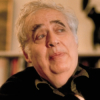Harold Bloom

Harold Bloom
Harold Bloomis an American literary critic and Sterling Professor of Humanities at Yale University. Since the publication of his first book in 1959, Bloom has written more than 20 books of literary criticism, several books discussing religion, and a novel. He has edited hundreds of anthologies concerning numerous literary and philosophical figures for the Chelsea House publishing firm. Bloom's books have been translated into more than 40 languages...
NationalityAmerican
ProfessionTeacher
Date of Birth11 July 1930
CountryUnited States of America
Harold Bloom quotes about
I saw the Oxford English Dictionary there for the first time.
I'm talking in the millions. I can't tell you one, two, three or 10. I'm just saying that it's in the millions.
I think that's not reading because there's nothing there to be read,
I realized early on that the academy and the literary world alike -- and I don't think there really is a distinction between the two -- are always dominated by fools, knaves, charlatans and bureaucrats. And that being the case, any human being, male or female, of whatever status, who has a voice of her or his own, is not going to be liked.
We read, frequently if not unknowingly, in search of a mind more original than our own.
...the Bible itself is less read than preached, less interpreted than brandished. Increasingly, pastors may drape a limply bound Book over the edges of the pulpit as they depart from it. Members of the congregation carry Bibles to church services; the paster announces a long passage text for his sermon and waits for people to find it, then reads only the first verse of it before he takes off. The Book has become a talisman.
It is hard to go on living without some hope of encountering the extraordinary.
Information is endlessly available to us; where shall wisdom be found?
What is supposed to be the very essence of Judaism - which is the notion that it is by study that you make yourself a holy people - is nowhere present in Hebrew tradition before the end of the first or the beginning of the second century of the Common Era.
Rebecca Mead's My Life in Middlemarch is a wise, humane, and delightful study of what some regard as the best novel in English. Mead has discovered an original and highly personal way to make herself an inhabitant both of the book and of George Eliot's imaginary city. Though I have read and taught the book these many years I find myself desiring to go back to it after reading Rebecca Mead's work.
A superb and dreadfully moving account of the glory and subsequent murder by the Romanians of the Jewish city in Odessa. . . . Odessa is both celebration and lament and equally impressive as both.
The true use of Shakespeare or of Cervantes, of Homer or of Dante, of Chaucer or of Rabelais, is to augment one's own growing inner self. . . . The mind's dialogue with itself is not primarily a social reality. All that the Western Canon can bring one is the proper use of one's own solitude, that solitude whose final form is one's confrontation with one's own mortality.
Hamlet, Kiekegaard, Kafka are ironists in the wake of Jesus. All Western irony is a repetition of Jesus' enigmas/riddles, in amalgam with the ironies of Socrates.
All that a critic, as critic, can give poets is the deadly encouragement that never ceases to remind them of how heavy their inheritance is.